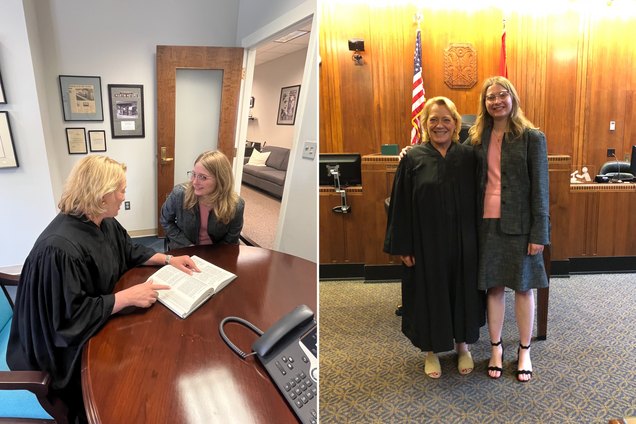KIP Student Feature – Sydney Aslan

Over the summer Sydney Aslan (CAS’26, Political Science) got the opportunity to intern with Chancellor Anne C. Martin in the Davidson County Chancery Court, Part II. In this feature, Sydney provides great advice about the importance of maintaining relationships and tells us more about her work in court.
The photos below show Sydney with Chancellor Anne C. Martin in her office and in the courtroom.

Q&A with Sydney Aslan
Could you give us a brief description of the organization you are interning with and what your primary responsibilities are during this internship?
I interned with Chancellor Anne C. Martin in the Davidson County Chancery Court, which has jurisdiction over most of the Nashville area. Chancery Court mainly deals with equity issues and as such sees a lot of business, employment, and construction-related cases. However, it also deals with constitutional issues, which were incredibly interesting to me. This summer, we had cases come up that challenged a law the Tennessee legislature passed as well as one that dealt with an incarcerated individual’s rights.
As an intern, I open and close court as well as observe court and discuss my thoughts and questions with Chancellor Martin. I also provide hands-on assistance wherever needed. For example, we had a week-long jury trial this summer where I did a lot with the jury, making sure they were in the right place, had everything they needed, etc. Chancellor Martin has also introduced me to a lot of other judges and let me sit in on different courtrooms as well as tour different aspects of the justice system. I’ve seen Probate Court, Divorce Court, and various other Circuit Court cases as well as toured the Domestic Violence Advocacy Center.
How did your internship fulfill the goals of social justice?
I believe that ensuring our country has a fair, equitable, and accountable judiciary is essential to preserving our rights and being able to advocate for social justice issues in our country. It was amazing to see how important it is for a judge to have a willingness to listen and a sense of empathy and understanding. It was also incredible to be able to see these intense and complex constitutional issues and challenges come up in court and learn about how the law is applied in each case.
Has the work you have done this summer changed how you think about social justice?
This internship helped me understand the necessity of a sort of inside-out approach to social justice. It is incredibly important to ensure that the laws in our country are administered fairly and that people’s constitutional rights, including the right to protest, are protected. This guarantee that the judiciary will be fair, impartial, and serve to protect people and their rights is an essential part of any country and acts as the basis for progress.
How did you find out about this internship, and what advice would you give to students hoping to apply for this funding opportunity in the future?
I previously interned for Chancellor Martin on her re-election campaign and stayed in contact after that internship. It’s incredibly important to stay in contact with your professors, employers, and anyone else you meet along your path. Many people like Chancellor Martin are amazingly kind and care about helping students grow in their education and their careers.
Because this is a government internship, it was an unpaid position. KIP was really amazing and allowed me to pursue this opportunity. Applying for KIP was a straightforward process, and the Kilachand administrators were extremely helpful with any questions I had. It was also important for me to start the application process early. The best time to apply for KIP was mid-March, so it was helpful to have my internship details squared away by then.
How has the Kilachand coursework helped prepare you for the work you are doing during your internship?
Kilachand has really helped me develop my critical thinking skills and ability to sort through complex issues to see what is happening now and what may be the ramifications of this in the future, which are skills I use daily in my internship while listening to cases and discussing them with Chancellor Martin. For example, in Studio 1 we read All That She Carried and then discussed the book and its implications throughout the semester. The book contained complex themes about how the impacts of slavery and racial injustices get passed down throughout generations and have lasting effects on families as well as our society as a whole. Analyzing this book and other works in the class really pushed me to develop my critical thinking skills and be able to look at issues in the long term. I use a very similar process to understand court cases by looking at how the law impacts decisions over time and how the current case fits into that.
Learn more about the Kilachand Internship Program here.